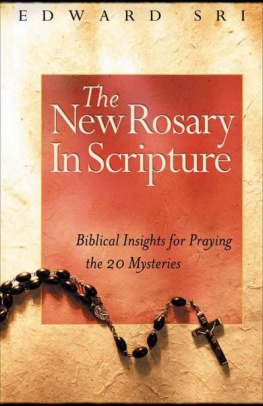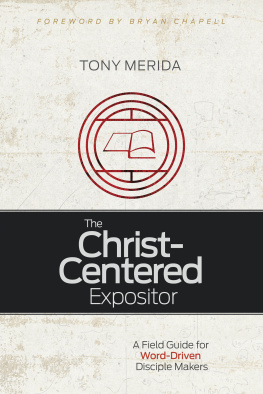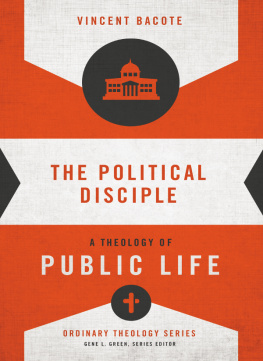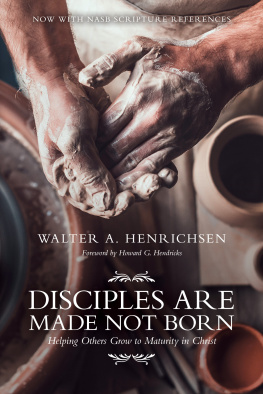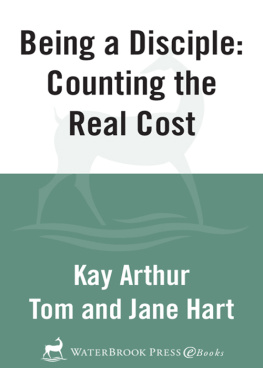Into His Likeness
Be Transformed
as a Disciple of Christ
By Edward Sri
Ignatius Press Augustine Institute
San Francisco Greenwood Village, CO
Ignatius Press Distribution
P.O. Box 1339
Fort Collins, CO 80522
Tel: (800) 651-1531
www.ignatius.com
Augustine Institute
6160 S. Syracuse Way, Suite 310
Greenwood Village, CO 80111
Tel: (866) 767-3155
www.augustineinstitute.org
All Scripture contained herein is from the Revised Standard Version, Second Catholic Edition 2000 and 2006 by the Division of Christian Education of the National Council of the Churches of Christ in the United States of America. All rights reserved.
Excerpts from the English translation
of the Catechism of the Catholic Church ,
Second Edition, 1994, 1997, 2000 by
Libreria Editrice Vaticana-United States Catholic Conference,
Washington, D.C.
All rights reserved
Cover Design: Ben Dybas
Photograph of author by K Caulfield Photography
2017 by Ignatius Press, San Francisco, and the Augustine Institute, Greenwood Village, CO All rights reserved.
ISBN: 978-0-9993756-5-5 (PB)
ISBN 978-1-68149-797-6 (EB)
Library of Congress Control Number 2017958991
To my son, Paul
TABLE OF CONTENTS
And we all, with unveiled face, beholding the glory of the Lord, are being changed into his likeness from one degree of glory to another; for this comes from the Lord who is the Spirit .
2 Corinthians 3:18
DO YOU LOVE ME?
Introduction
On a spring morning along the Sea of Galilee some 2,000 years ago, the Risen Jesus asks his disciple Peter this deeply personal question: Do you love me?
At first glance, we might expect Peter to give a whole-hearted Yes! After all, Peter was one of Jesuss first disciples. He had left his fishing nets behind and made many sacrifices to follow Jesus for the last three years. Moreover, Jesus selected Peter as one of the Twelve Apostles to whom he entrusted his mission of proclaiming the Kingdom of God. To top it off, Peter was the first to confess explicitly that Jesus was the Messiah and as a result was given the keys of the kingdom, symbolizing his special role of leadership among the Twelve.
Thats why Jesuss question Do you love me? seems on the surface to be a no-brainer. Of course Peter loves Jesus! Peter the Fisherman-Turned-Disciple, Peter the Chosen Apostle, Peter the First Popesurely he would be a model of faithfulness!
But the word Jesus uses for love here makes Peter pause. The Gospel of John employs the Greek word agapao , which describes total, unconditional, self-giving lovethe kind of committed, sacrificial love Jesus models throughout his life, most especially on the Cross. Jesus, therefore, is not asking Peter if he loves merely with ordinary human affection. Another Greek word, phileo , tends to describe that kind of lovethe love of friendship, tender but not all-encompassing.
At this, Peter holds back. He knows he cant go there. He sadly wishes he could say yes, and in the past his naive overzealousness may have led him to do so. In fact, not too long ago, Peter even boldly pledged his absolute fidelity to Jesus, saying at the Last Supper, Lord, I am ready to go with you to prison and to death (Lk 22:33). But his threefold denial of Christ later that same night makes Peters shortcomings in agape painfully clear. Peter gives in to fear, betrays his friend three times, and turns away weeping bitterly when he realizes what he has done. He has tasted the bitter sorrow of his weakness and infidelity.
So now, a much more humbled Peter qualifies his affirmation of love. He admits to Jesus, Lord, you know that I love you ( phileo ). Its as if Peter is saying, You of all people, Jesus, know how far away I am from agape . You know that I am only capable of loving you with my imperfect human love: philia .
Jesus, however, doesnt back down. He asks a second time, Do you love ( agapao ) me? Again, Peter humbly admits he can only love Jesus with his lesser human love: Lord, you know that I love you ( phileo ).
Finally, Jesus changes the question. He does not lower the standard of love in any way, but he does lower himself to meet Peter where he is. He accepts what Peter can offer, even if its only weak, human love. He uses the word phileo : Do you love ( phileo ) me? Here, Jesus puts himself on Peters level and does not demand that Peter immediately rise up to his. And thats encouraging to Peter. He replies to Jesus as if to say, Lord, you know everything. You know this is all I can do on my own. The best I am capable of offering is my weak, human love: philia . I wish I could do more, but I humbly entrust this imperfect gift to you.
And here we come to the most amazing part of the storyand the one that sheds light on the drama of our own walk with the Lord. Jesus accepts this imperfect human love of Peters and transforms it into agape . Peter finally presents himself to Jesus as he really isnot in the inflated view he previously had of himself or in the ideal way hed like to live someday, but in the truth of his own fragility. And once Peter does this, once he comes to terms with the truth about himselfthat he is simply not capable of agape right nowa new era begins in Peters friendship with Christ. At precisely this moment, Jesus suddenly starts talking about how Mr. Philia Peter will one day live agape like Christ himself did. Peter will be changed. His heart will be transformed. One day, Peter will find his hands stretched out on a cross like Jesuss were on Good Friday. Indeed, Jesus foretells Peters crucifixion in Rome: When you are old, you will stretch out your hands, and another will fasten your belt for you and carry you where you do not wish to go (This he said to show by what death he was to glorify God) (Jn 21:18-19).
The story of Peters transformation is the story God wants to write in the hearts of all disciples. Jesus wants to meet us where we are, as we are, with all our fears, wounds, and sins, and transform our philia hearts into agape hearts. As Pope Benedict XVI once observed,
From that day, Peter followed the Master with the precise awareness of his own fragility; but this understanding did not discourage him. Indeed, he knew that he could count on the presence of the Risen One beside him. From the naive enthusiasm of initial acceptance, passing through the sorrowful experience of denial and the weeping of conversion, Peter succeeded in entrusting himself to that Jesus who adapted himself to his poor capacity of love. And in this way he shows us the way, notwithstanding all of our weakness. We know that Jesus adapts himself to this weakness of ours. We follow him with our poor capacity to love and we know that Jesus is good and he accepts us.
What Jesus did in Peter he will do in each of usif we learn to follow him as a disciple.
Being a Disciple
In the first-century world of Jesus, being a disciple was all about one key word: imitation. When a disciple followed a rabbi, he lived with the rabbi, shared meals with the rabbi, prayed with the rabbi, and studied with the rabbi. The goal of the disciple wasnt merely to master his rabbis teachings, but to imitate the way he livedthe way he prayed, worked, trusted in Gods providence, helped the poor, lived friendship, and served the people.
So if we are going to be disciples of Jesus today, we must aim for a lot more than believing a set of doctrines and following the rules of our faith. We must go deeper and consider whats happening interiorly in our spiritual lives: Are we moving closer to Christ, encountering him anew each day and becoming more like him? Do we intentionally strive to live like him, think like him, and love like him? Being a disciple of Jesus is not about merely going through the motions with our faithattending Mass, saying some prayers, and avoiding bad things. Following Jesus as a disciple is a whole way of life his way of life transforming us, his agape love radiating through our lesser philia love.





